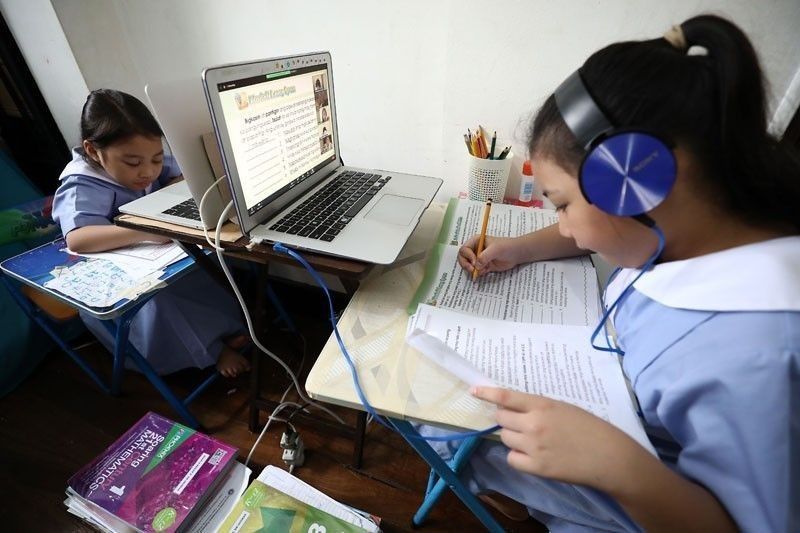Commentary: Doing right by education

The COVID-19 pandemic has definitely changed a lot of things in our lives. Perhaps, every facet of our lives has been significantly altered, one way or the other. Take the case of wearing face masks.
Despite the barrage of admonition from government that wearing masks prevents the transmission of the disease—and thus, may save lives—nearly everyone has some hesitation complying with it and even shudder at the thought that it will become a permanent accessory in our daily lives.
Yet, even after the pandemic, the face mask will continue to be a strong reminder of the death of some four million people—and counting—worldwide. What used to be commonplace in the medical profession and in some countries, as in Japan, would scar our memories and take on a much different meaning to people who will live through the COVID-19 pandemic.
For those things that do stand a chance of going back to how it was, it may take a long time in coming. It would probably take several years before people start trusting each other with a firm handshake and a warm hug. It may take a while before suspicious stares directed at those who cough or sneeze in public—even with cover—return to being ordinarily dismissed.
But the changes are not only in the simple and mundane things. The pandemic has also brought about significant transformations in how we work. Already, companies are gearing up for more remote working and an acceleration of digitization.
Other industries are not as fortunate. They may have to brace for more permanent reduction in their business. The rise of virtual meetings, for instance, may become a disadvantage for business travel. The uptrend in e-commerce may also signal a slowing down in the leasing of spaces for brick-and-mortar shops.
One sector where the pandemic has been significantly felt is education. A United Nations policy brief on education during COVID-19 and beyond, released in August 2020, asserts that the pandemic has created the largest disruption of education systems in history, affecting nearly 1.6 billion learners in more than 190 countries.
In particular, based on a study made by Opportunity EduFinance—an international group that aims to provide a unique and sustainable approach to tackling the global education crisis by offering market-driven solutions—the school median revenue fell by as much as 80%.
The direct cause of this school revenue decline is the concomitant drop in individual income brought about by the economic slowdown. When parents have lower income, they find it more difficult to bear the direct costs of education, such as tuition, miscellaneous fees, books and supplies. This situation, in turn, creates a cycle of lower student enrollment and, thus, deeper revenue shortfalls that could eventually lead to school bankruptcy.
This is exactly what private schools in the country have been experiencing. The lockdowns have caused an economic performance of negative 9.5% in 2020—the worst since 1947. As expected, this has caused unemployment and underemployment to sharply rise and household income to also drop. And, because of this, the survival of private schools hangs by a thread.
But that thread is largely tied to Congress. Generally speaking, only public educational institutions—because they rely on budget appropriations instead of tuition revenues for their survival—wait with bated breath regarding their continued existence. This time, however, even private schools are in the same boat.
The Bureau of Internal Revenue (BIR) issued Revenue Regulation (RR) No. 5-2021 in April this year that would impose a tax rate of 25% on all private educational institutions. This has become controversial because it represents a whopping 150% increase from the current 10%. Moreover, the new rate disregards the one percent that Congress granted to proprietary educational institutions from July 2020 until the end of June in 2023 as a tax relief under the CREATE Law.
Since then, the Coordinating Council of Private Educational Associations (COCOPEA) and the Philippine Association of Colleges and Universities have been relentless in opposing the revenue regulation.
The good news is that the BIR has suspended certain provisions of RR 5-2021 relating to the controversy in consideration of pending bills in both the House of Representatives and the Senate that would amend the National Internal Revenue Code (NIRC) in order to clarify the definition of proprietary educational institutions and clarify the tax treatment.
The not-so-good news is that until a consolidated version of the bills are passed in Congress and signed by the president into law, the tax respite the private schools are enjoying from the suspension of RR 5-2021 is provisional, temporary, and therefore, precarious.
More alarming also is that the proposed legislative measure is running against time. With eleven months left in the administration, the urgency of the amendment to the NIRC has to compete with the increasing priority needed to address the effects of the pandemic and the increasing time prematurely devoted to the next presidential elections.
COCOPEA, represented by its managing director, lawyer Joseph Noel Estrada, stressed that, “without this curative legislation, the suspension may be withdrawn again or reversed anytime by the BIR and DOF given the history of revenue issuances on this matter.”
Our leaders should do right by education and pass this landmark measure that would guarantee that private schools will be able to sustain its complementary role with the public schools in pursuing quality education for our people.
Edwin Santiago is a fellow and member of the editorial board of think tank Stratbase ADR Institute.
- Latest





























